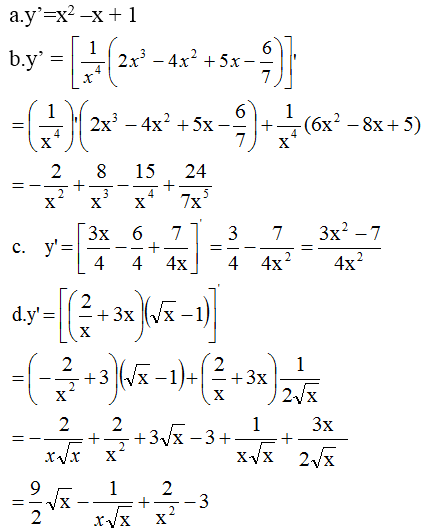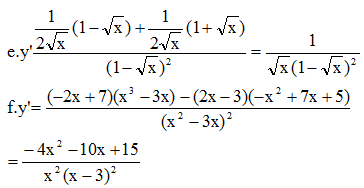Hãy nhập câu hỏi của bạn vào đây, nếu là tài khoản VIP, bạn sẽ được ưu tiên trả lời.

2, sin4x+cos5=0 <=> cos5x=cos\(\left(\frac{\pi}{2}+4x\right)\Leftrightarrow\orbr{\begin{cases}x=\frac{\pi}{2}+k2\pi\\x=-\frac{\pi}{18}+\frac{k2\pi}{9}\end{cases}\left(k\inℤ\right)}\)
ta có \(2\pi>0\Leftrightarrow k< >\frac{1}{4}\)do k nguyên nên nghiệm dương nhỏ nhất trong họ nghiệm \(\frac{\pi}{2}\)khi k=0
\(-\frac{\pi}{18}+\frac{k2\pi}{9}>0\Leftrightarrow k>\frac{1}{4}\)do k nguyên nên nghiệm dương nhỏ nhất trong họ nghiệm \(-\frac{\pi}{18}-\frac{k2\pi}{9}\)là \(\frac{\pi}{6}\)khi k=1
vậy nghiệm dương nhỏ nhất của phương trình là \(\frac{\pi}{6}\)
\(\frac{\pi}{2}+k2\pi< 0\Leftrightarrow k< -\frac{1}{4}\)do k nguyên nên nghiệm âm lớn nhất trong họ nghiệm \(\frac{\pi}{2}+k2\pi\)là \(-\frac{3\pi}{2}\)khi k=-1
\(-\frac{\pi}{18}+\frac{k2\pi}{9}< 0\Leftrightarrow k< \frac{1}{4}\)do k nguyên nên nghiệm âm lớn nhất trong họ nghiệm \(-\frac{\pi}{18}+\frac{k2\pi}{9}\)là \(-\frac{\pi}{18}\)khi k=0
vậy nghiệm âm lớn nhất của phương trình là \(-\frac{\pi}{18}\)

\(sin^2x+\sqrt{3}sinxcosx=1\)
\(\Leftrightarrow sin^2x+\sqrt{3}sinxcosx=sin^2x+cos^2x\)
\(\Leftrightarrow cosx\left(\sqrt{3}sinx-cosx\right)=0\)
\(\Leftrightarrow\orbr{\begin{cases}cosx=0\\\sqrt{3}sinx=cosx\end{cases}}\Leftrightarrow\orbr{\begin{cases}cosx=0\\tanx=\frac{1}{\sqrt{3}}\end{cases}}\)
Từ đây suy ra nghiệm.

a) Cách 1: y' = (9 -2x)'(2x3- 9x2 +1) +(9 -2x)(2x3- 9x2 +1)' = -2(2x3- 9x2 +1) +(9 -2x)(6x2 -18x) = -16x3 +108x2 -162x -2.
Cách 2: y = -4x4 +36x3 -81x2 -2x +9, do đó
y' = -16x3 +108x2 -162x -2.
b) y' = .(7x -3) +
(7x -3)'=
(7x -3) +7
.
c) y' = (x -2)'√(x2 +1) + (x -2)(√x2 +1)' = √(x2 +1) + (x -2) = √(x2 +1) + (x -2)
= √(x2 +1) +
=
.
d) y' = 2tanx.(tanx)' - (x2)' =
.
e) y' = sin
=
sin
.

ĐK: \(x\ne\frac{k\pi}{2}\)
pt<=> \(8\sin x-\frac{4}{\sin x}=\frac{3}{\cos x}-\frac{3}{\sin x}\)
<=> \(4.\frac{2\sin^2x-1}{\sin x}=3.\frac{\sin x-\cos x}{\sin x.\cos x}\)
\(\Leftrightarrow4.\frac{\sin^2x-\cos^2x}{\sin x}=3.\frac{\sin x-\cos x}{\sin x.\cos x}\)
\(\Leftrightarrow4.\left(\sin x+\cos x\right)\left(\sin x-\cos x\right)=3\frac{\sin x-\cos x}{\cos x}\)
\(\Leftrightarrow\orbr{\begin{cases}\sin x-\cos x=0\left(1\right)\\4\left(\sin x+\cos x\right)=\frac{3}{\cos x}\left(2\right)\end{cases}}\)
(1) \(\Leftrightarrow\sqrt{2}\sin\left(x+\frac{\pi}{4}\right)=0\) ( tự giải nhé)
(2) \(\Leftrightarrow4\sin x.\cos x+4\cos x.\cos x=3\)
\(\Leftrightarrow2\sin2x+2\cos2x+2=3\)
\(\Leftrightarrow\sin2x+\cos2x=\frac{1}{2}\)
\(\Leftrightarrow\sqrt{2}\cos\left(2x+\frac{\pi}{4}\right)=\frac{1}{2}\)Tự giải nhé!

a) =
=
.
b) =
=
.
c) =
=
.
d) y' =\(\dfrac{\left(x^2+7x+3\right)'\left(x^2-3x\right)-\left(x^2+7x+3\right)\left(x^2-3x\right)'}{\left(x^2-3x\right)^2}\)=\(\dfrac{\left(2x+7\right)\left(x^2-3x\right)-\left(x^2+7x+3\right)\left(2x-3\right)}{\left(x^2-3x\right)^2}\)=\(\dfrac{-2x^2-6x+9}{\left(x^2-3x\right)^2}\)


y ' = 9 - 2 x 3 x 2 - 3 x + 1 ' = ( 9 − 2 x ) ' . ( 3 x 2 − 3 x + 1 ) + ( 3 x 2 − 3 x + 1 ) ' . ( 9 − 2 x ) = − 2 ( 3 x 2 − 3 x + 1 ) + ( 6 x − 3 ) ( 9 − 2 x )
= − 6 x 2 + 6 x − 2 + 54 x − 12 x 2 − 27 + 6 x = − 18 x 2 + 66 x − 29
Chọn đáp án C